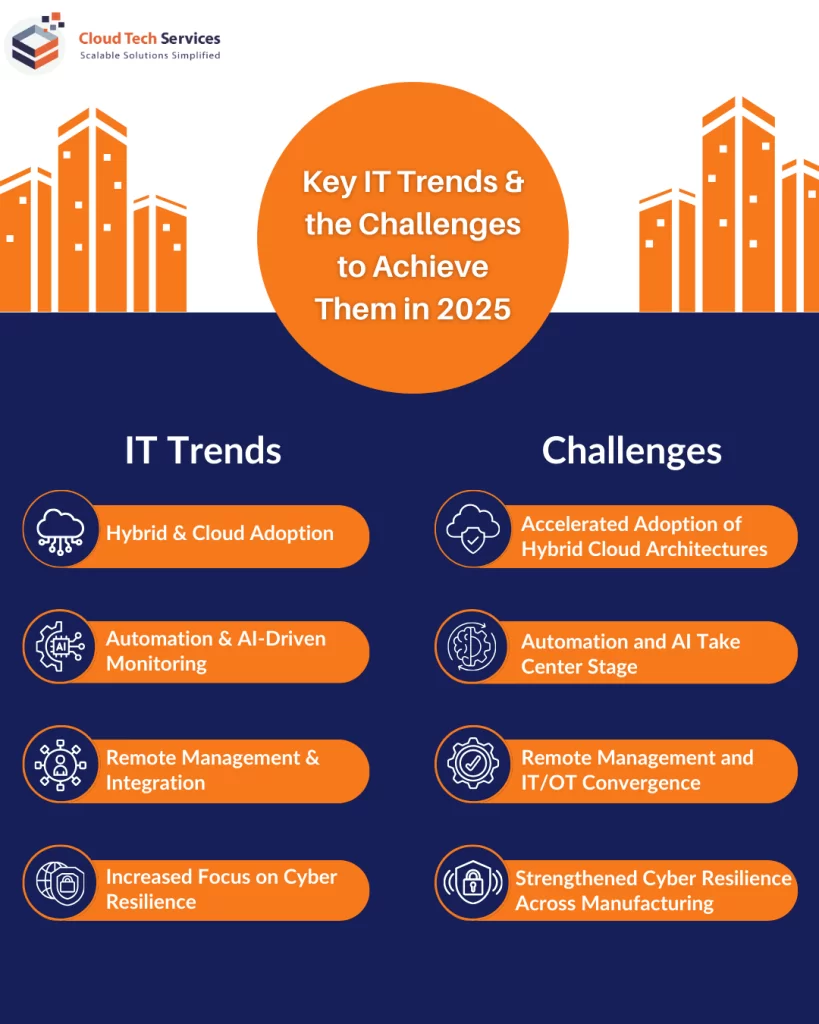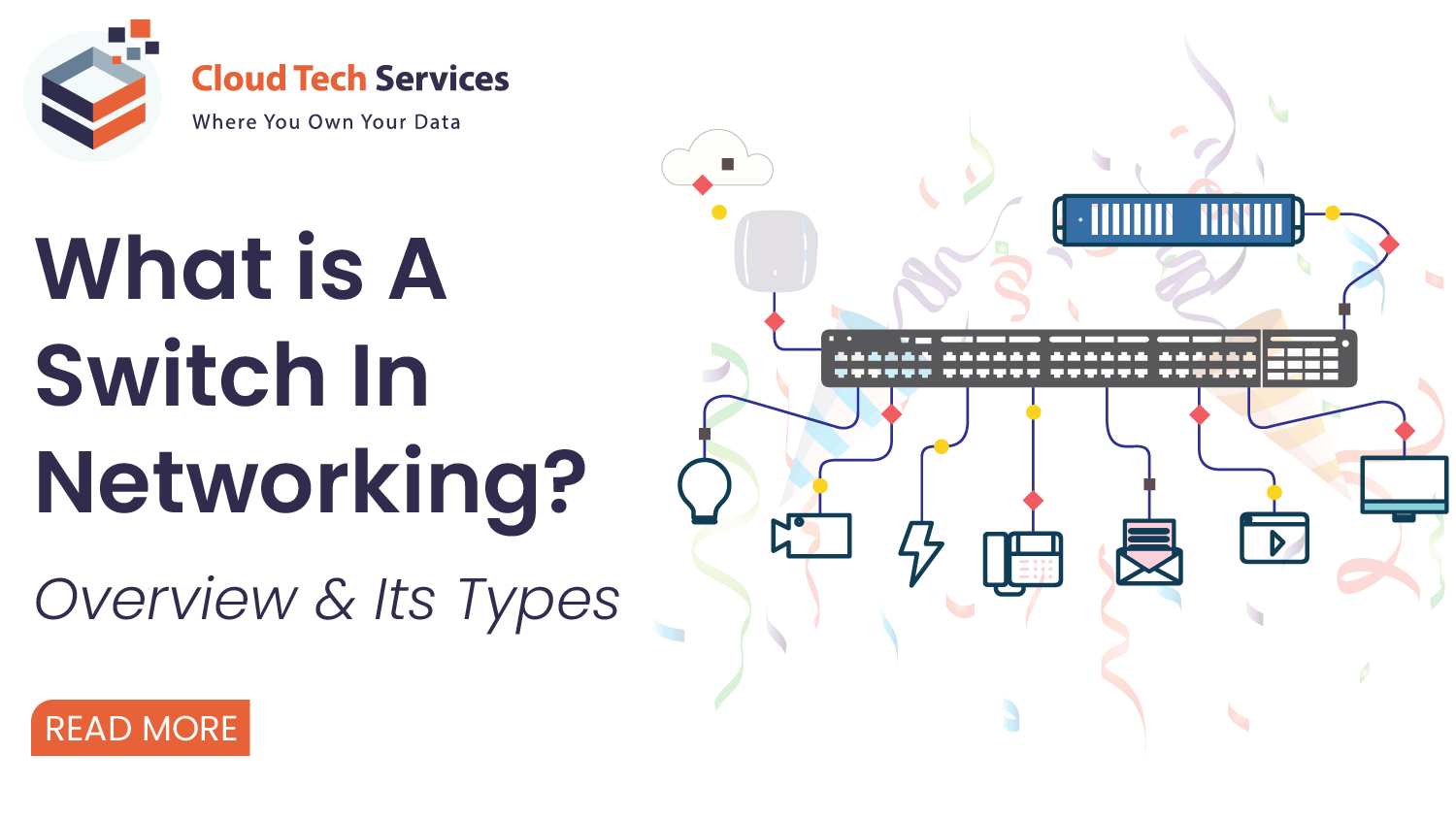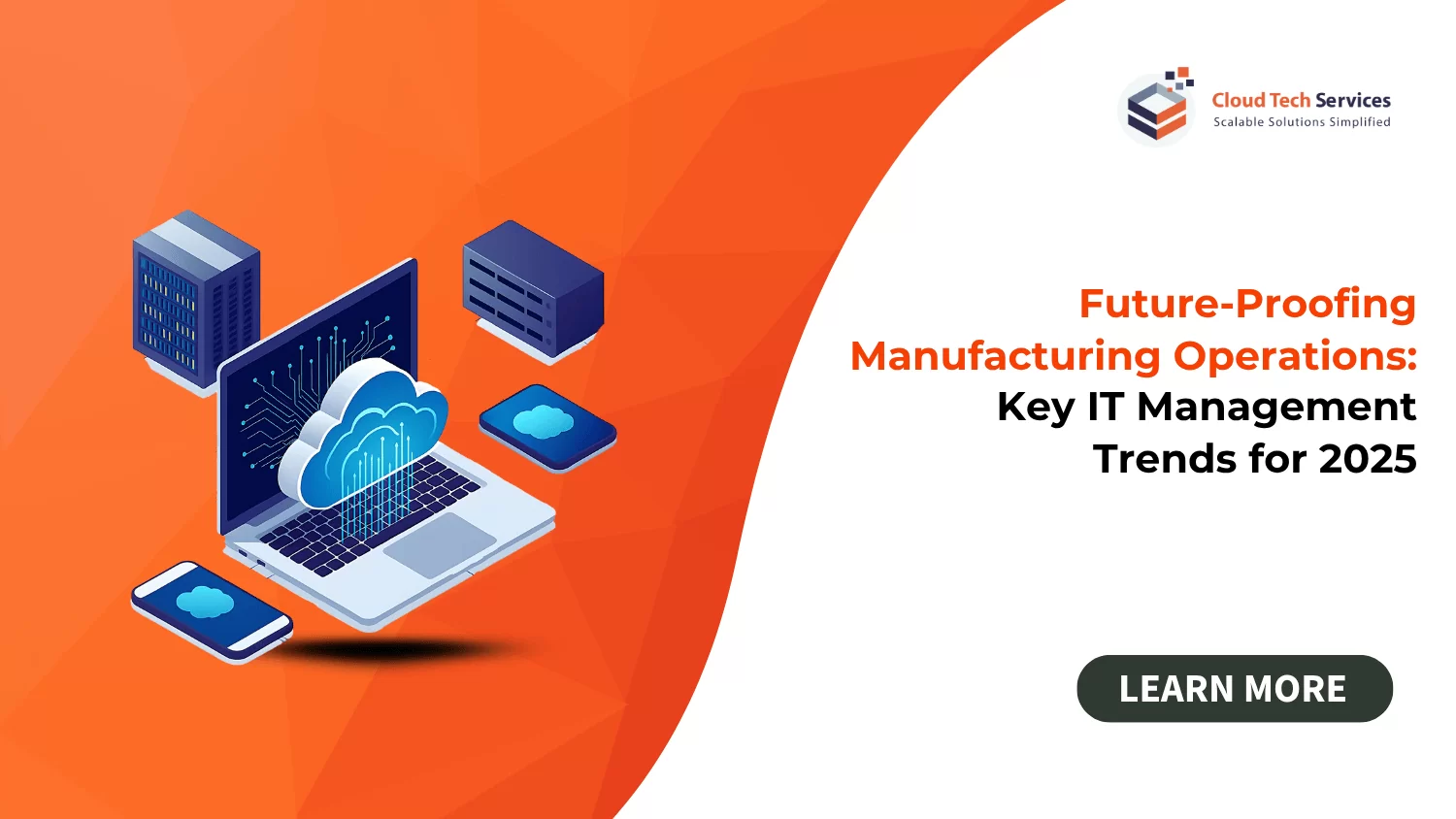Future-Proofing Manufacturing Operations: Key IT Management Trends for 2025
Blog Summary
In an era where digital transformation drives industrial innovation, manufacturing operations must evolve to keep pace with growing demands. Traditional IT approaches are no longer adequate to support the agility, security, and scalability manufacturers need. As organizations increasingly rely on connected systems, automation, and proactive data, the need for future-ready network infrastructure becomes business-critical.
At Cloud Tech Services (CTS), we recognize that future-proofing manufacturing Operations is not about chasing trends it’s about building intelligent, secure, and resilient environments that power operational excellence. In 2025, four key trends are shaping how manufacturing companies design, manage, and secure their networks: hybrid cloud adoption, AI-powered automation, remote IT-OT integration, and cyber resilience.
Table of Contents
Trends in IT Management for 2025
Hybrid Adoption:
Manufacturing firms are adopting hybrid environments to balance performance, cost and flexibility. Hybrid operation support the seamless integration of on-premises infrastructure with cloud-hosted services, enabling proactive operations, centralized control, and scalable expansion. This shift empowers manufacturers to modernize without disrupting existing systems, ensuring both agility and business continuity.
Automation & AI-Driven Monitoring:
In 2025, manufacturing operations [GU1] are increasingly leveraging AI for proactive maintenance, early threat detection, and network optimization. AI is redefining network management through predictive analytics, automation, and intelligent monitoring. By reducing human intervention in critical areas, manufacturers can minimize downtime, streamline operations, and strengthen overall IT performance.
Remote Management & Integration:
Manufacturers are moving toward 24/7 remote management of both IT and operational technology (OT) systems. Cloud-native tools now allow unified visibility and control across global sites, while IT-OT integration breaks down data silos. This convergence enhances decision-making, ensures system interoperability, and enables faster incident response from anywhere.
Increased Focus on Cyber Resilience:
With increased connectivity comes greater risk. Manufacturers are prioritizing cyber resilience by implementing AI-enhanced threat detection, endpoint security, and compliance-driven strategies. The goal is not only to defend against breaches but to recover quickly and maintain operations making cybersecurity a foundational element of network planning in 2025.
Challenges Faced to Attain these Trends:
Accelerated Adoption of Hybrid Cloud Architectures
As manufacturing organizations transition to hybrid cloud models, one of the primary challenges lies in ensuring seamless integration between cloud and on-premise infrastructure. Legacy systems, often outdated or customized, aren’t always cloud-compatible, making the migration process complex and risky. Additionally, hybrid environments introduce increased network complexity, requiring advanced governance frameworks to manage access, workload distribution, and data movement across platforms. Balancing the cost-efficiency of the cloud with the performance needs of proactive manufacturing systems also remains a significant hurdle, especially when cloud usage is not continuously optimized.
Automation and AI Take Center Stage
The rise of automation and AI in IT management demands a complete overhaul of traditional processes, which poses several operational and strategic challenges. Many manufacturers struggle with fragmented or poor-quality data, which undermines the effectiveness of AI-driven insights and predictive capabilities. Building a scalable AI framework also requires substantial investment in infrastructure and skilled personnel, which may not be readily available. Furthermore, deploying automation at scale can introduce reliability concerns one misconfigured workflow can lead to significant disruptions on the floor. Ensuring accuracy, oversight, and alignment with business goals is critical as organizations adopt these intelligent technologies.
Remote Management and IT/OT Convergence
Achieving effective remote management while converging IT and OT environments presents both technological and organizational challenges. Unlike IT systems, OT environments often involve proprietary protocols and proactive controls that are sensitive to latency and external interference. Integrating these systems into a unified network requires highly specialized tools and deep industry knowledge. On the organizational front, there’s a persistent disconnect between IT and OT teams, each operating under different priorities and security frameworks. Establishing clear governance, cross-functional collaboration, and centralized visibility is crucial to prevent security gaps and ensure operational consistency across both domains.
Strengthened Cyber Resilience Across Manufacturing Operations
Cybersecurity in manufacturing is no longer limited to IT it extends to every connected device, control system, and production asset. One of the biggest challenges in building cyber resilience is achieving full visibility into all digital assets, especially in complex, hybrid environments with legacy machines and modern IoT devices. Cyber threats are becoming more sophisticated, yet many organizations still rely on outdated security models that lack adaptive, proactive capabilities. In addition, compliance with evolving regulatory standards such as CMMC, NIST, and ISO demands constant monitoring and auditing. IT leaders must shift from a reactive approach to a proactive, risk-based security strategy to truly protect operational integrity.

How CTS Supports
At Cloud Tech Services (CTS), we understand that addressing tomorrow’s IT landscape requires more than tools, it requires transformation. Our services are designed to challenges that modern manufacturers face as they evolve toward hybrid, intelligent, and resilient operations.
Overcoming Hybrid Complexity
We simplify the transition to hybrid environments by offering comprehensive cloud architecture planning, secure workload migration, and integration services that ensure legacy on-prem systems remain fully operational during and after deployment. CTS also helps prevent cloud sprawl through usage monitoring, cost optimization strategies, and governance controls, enabling sustainable performance.
Enabling Scalable AI and Automation
CTS helps manufacturers harness AI by first creating a solid foundation: data normalization, integrity validation, and streamlined integration of sensors and IoT inputs. Our AI-driven monitoring and analytics tools enable proactive insights, predictive maintenance, and intelligent alerting. We also provide custom automation frameworks that minimize operational risk and reduce human error helping organizations transition confidently from manual to autonomous operations.
Bridging IT/OT & Supporting Remote Management
Our platform enables 24/7 remote management of both IT and OT assets via unified dashboards and centralized control systems. CTS engineers specialize in IT/OT convergence, ensuring seamless integration of proprietary protocols and proactive control systems. We also facilitate inter-team alignment with collaborative frameworks that improve communication, streamline incident response, and enhance operational continuity across departments.
Advancing Cyber Resilience and Compliance
CTS delivers end-to-end cybersecurity services tailored to manufacturing operations from asset discovery and threat surface management to vulnerability scanning and SOC-as-a-Service. We help organizations implement adaptive defense models and ensure alignment with evolving standards like CMMC, NIST, and ISO. Our proactive, risk-based approach empowers manufacturers to defend against advanced threats and meet compliance with confidence.















